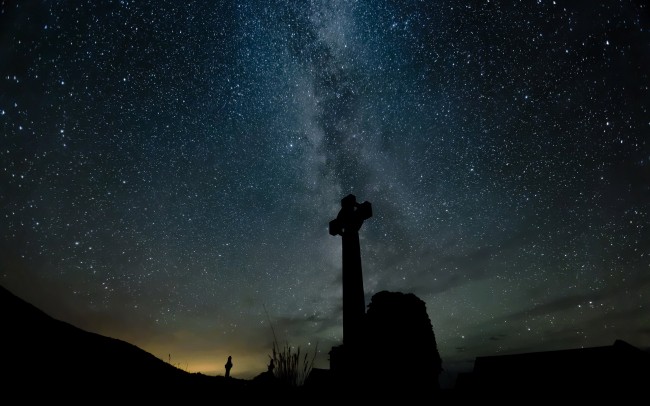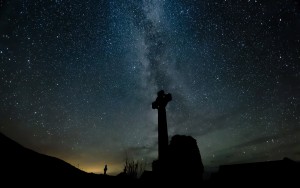Let the glory of the LORD endure forever; let the LORD be glad in His works. (Psalm 104:31)
 You ever wonder about the personal pronouns in the Bible? They are there for several reasons (and not just grammatical), and here are a few:
You ever wonder about the personal pronouns in the Bible? They are there for several reasons (and not just grammatical), and here are a few:
When God uses them, they become a way for us to relate to Him, because they reveal a very personal perspective of a Holy, transcendent God.
They are there because we are largely self-centered and selfish creatures.
They are there to allow us to identify with the authors, so when they say “I”, or “me” or “my” or “mine”, we can find ourselves in “their” shoes, saying or doing the same thing.
But the absence of personal pronouns can be telling. Take Psalm 104. It is a song of God’s glory, and His works, and how all creation declares the same. And we don’t get around to a personal pronoun until verse 33. Why is that?
The psalmist (probably David) is completely caught up in Who God is and What He has done. And when he is finally able to gather himself, what does he do? He worships.
I will sing to the LORD as long as I live; I will sing praise to my God while I have my being. (vs. 33)
Notice the extent of this singing and praising. And justifiably so, if we are considering the glory, the grandeur, and the greatness of The One True God.
There’s a scene in Carl Sagan’s movie Contact, where Ellie Arroway’s father talks about the size of the universe. And when he’s done, he states that if we are the only creatures in the universe, then that’s a lot of wasted space. My friend Dr. Ray Bohlin of Probe Ministries made a great comment when we saw the movie, reminding me, “The heavens declare the glory of God.” So it’s not a matter of wasted space. The universe is just doing what it is supposed to be doing. Declaring the glory of God.
Take some time and read Psalm 104. Get caught up in the LORD; join with David and declare the glory of God. Then do it for a lifetime!

 distance between heaven and earth as an illustration of how great God’s mercy is. And the distance between east and west, an illustration of how far God has removed our sin from us.
distance between heaven and earth as an illustration of how great God’s mercy is. And the distance between east and west, an illustration of how far God has removed our sin from us.
 Here is the next verse which also reveals the scope of His actions.
Here is the next verse which also reveals the scope of His actions. How great is His lovingkindness (mercy)? For as high as the heavens are above the earth. This shows how lofty His nature, and how low He will stoop for us to receive His mercy.
How great is His lovingkindness (mercy)? For as high as the heavens are above the earth. This shows how lofty His nature, and how low He will stoop for us to receive His mercy. It’s easy to understand why the Pharisees we so comfortable with their religion—they believed they had a lock on access to the One True God. The also believed they had a lock on the location: For now I have chosen and consecrated this house that My name may be there forever, and My eyes and My heart will be there perpetually. (2 Chronicles 7:16)
It’s easy to understand why the Pharisees we so comfortable with their religion—they believed they had a lock on access to the One True God. The also believed they had a lock on the location: For now I have chosen and consecrated this house that My name may be there forever, and My eyes and My heart will be there perpetually. (2 Chronicles 7:16) We see, as Christ said, that salvation comes through the Jews, it starts with the Jews. But it’s no longer about the Mosaic ritual; rather it’s about worshiping in spirit and truth, for God is spirit. Those who will worship in spirit and truth Lord may do so from any where. This was great news for the Samaritans (see John 4:39-42) and for us Gentiles. This then gives a different interpretation to the above passage from Psalm 86. We can now come and worship before You, O Lord, any where and at any time. This is what Christ has accomplished for us. Why not worship Him now?
We see, as Christ said, that salvation comes through the Jews, it starts with the Jews. But it’s no longer about the Mosaic ritual; rather it’s about worshiping in spirit and truth, for God is spirit. Those who will worship in spirit and truth Lord may do so from any where. This was great news for the Samaritans (see John 4:39-42) and for us Gentiles. This then gives a different interpretation to the above passage from Psalm 86. We can now come and worship before You, O Lord, any where and at any time. This is what Christ has accomplished for us. Why not worship Him now? 40 years ago I was in a Bible study with the pianist from the Christian band Glad, Bob Kauflin, and occasionally he’d teach us some new songs. One that he taught us was the above Psalm. I can still sing and play it, but I don’t know who wrote the music.
40 years ago I was in a Bible study with the pianist from the Christian band Glad, Bob Kauflin, and occasionally he’d teach us some new songs. One that he taught us was the above Psalm. I can still sing and play it, but I don’t know who wrote the music. This Psalm was written by David, and it is one of 15 “Songs of Ascents”. And although there is no way to know the actual meaning of this term, many believe these were the Psalms the priests and pilgrims sang as they made their way through Jerusalem up to the Temple.
This Psalm was written by David, and it is one of 15 “Songs of Ascents”. And although there is no way to know the actual meaning of this term, many believe these were the Psalms the priests and pilgrims sang as they made their way through Jerusalem up to the Temple. Last week I mentioned how context is critical to understanding and applying Scripture. I then showed the what the above verse was sandwiched in between:
Last week I mentioned how context is critical to understanding and applying Scripture. I then showed the what the above verse was sandwiched in between:
